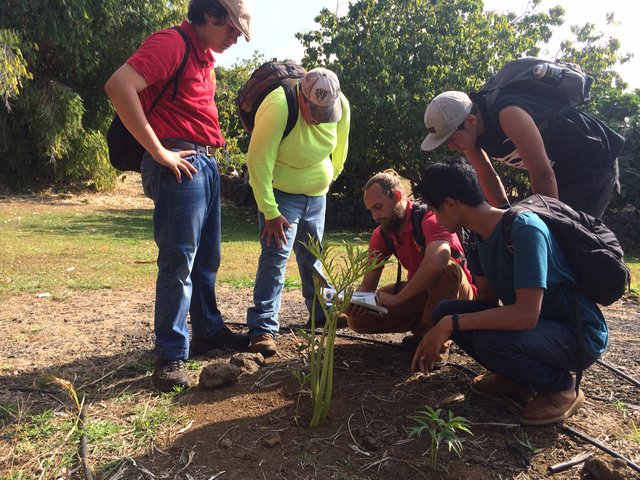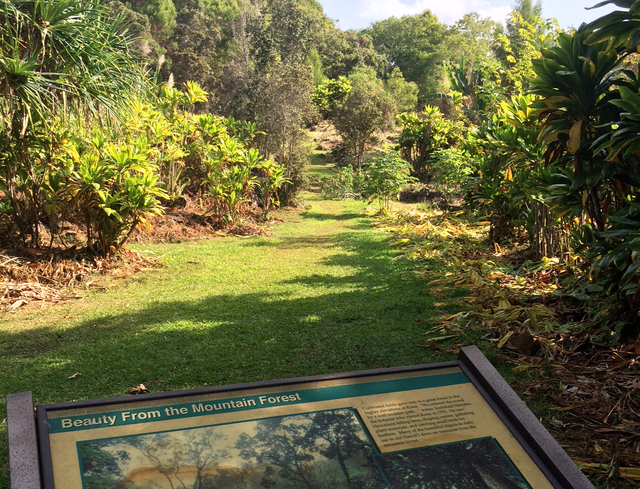CAPTAIN COOK — It was the taro that drew the Waimea charter school students to visit the Amy B.H. Greenwell Ethnobotanical Garden in the last days before the landmark closes. ADVERTISING CAPTAIN COOK — It was the taro that drew
CAPTAIN COOK — It was the taro that drew the Waimea charter school students to visit the Amy B.H. Greenwell Ethnobotanical Garden in the last days before the landmark closes.
The garden holds a repository of the traditional food plant — varieties that might otherwise be lost to time. It is home to other fragments of the ancient Hawaiian landscape too numerous to count — the rare hala pepe; the alaa tree and the hau kuahiwi, an endangered plant that is now extinct in the wild.
Sunday is the last day the public will be able to amble, enjoy and learn in the 15-acre landscape. The Bishop Museum, to which the land was donated in 1974 by the late botanist Amy Greenwell, plans to sell off the garden and Waipio Valley land for a total of about 500 acres valued recently near $10 million.
Ki Teya Belford-Smith, a teacher at Kanu o ka Aina charter school, led his students on a field trip of the garden for their food sovereignty class on Friday. The school has its own repository of taro and the class wanted to study the garden’s collection of the plant. The group also clustered around a pia plant, a form of arrowroot brought to the island by early Polynesian settlers.
“I think it’s a treasure; it’s a legacy of the old Kona Field System that must be preserved,” Belford-Smith said of the garden. “Maybe the community can come together and figure out a way. I’m not sure.”
At the garden’s gift shop, shelves stood empty and employees put in their last days of work. Along the garden paths, Captain Cook resident Frank Register and his wife Tracy wandered, taking in the sights.
Like others, they came on Friday essentially to say goodbye.
“It’s a sad deal,” Frank Register said. “What a beautiful place.”
Foot traffic through the garden was about average; a half dozen cars stood in the parking lot. As usual, it wasn’t hard to find quiet green places without another soul around.
“What a great resource for West Hawaii,” said Tracy Register. “When you look around, you see how many of these plants have become extinct.”
Kealakekua Ranch and the Greenwell family — who say they were caught off guard by the announcement of the Bishop Museum decision to sell — have been working to find ways to keep the garden open. A group of about 30 community members met last weekend to hash out ways to get the stewardship of the garden into the hands of a suitable nonprofit organization.
In a Jan. 12 letter addressed to the garden’s “inner circle” and obtained by the newspaper, the museum explained that it has spent recent years focusing on exhibits, programs and partnerships at the Kapalama campus, and that a recent business planning process has shown “the need for transformational changes to the museum’s operational mix for the sake of financial sustainability and to ensure the perpetuity of our greatest priority, our community’s treasured Hawaiian and Pacific collections for future generations … To this end, Bishop Museum will be closing its operation at the Amy B.H. Greenwell Ethnobotanical Garden … in order to focus on its Kapalama campus.”
Garden visitor Cherish Ravenscraft said she doesn’t think it’s unrealistic for a community group to pull together and take over the garden. It just requires will and group effort, she said.
“Being in a place where you can see how all of the plants coexist — and their relevance to Hawaiian society,” she said. “It’s going to be a great loss.”




